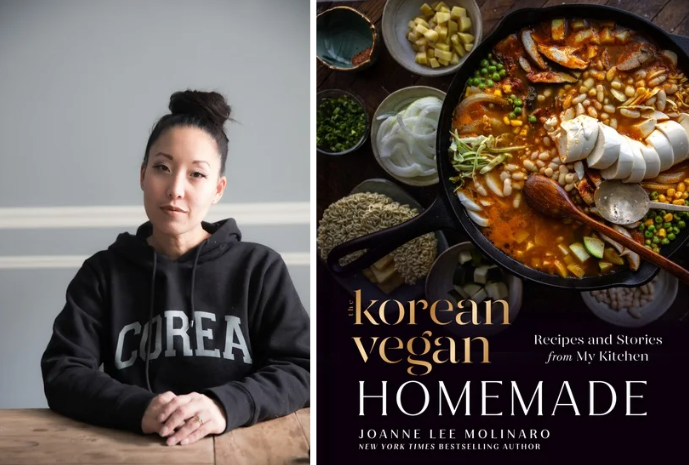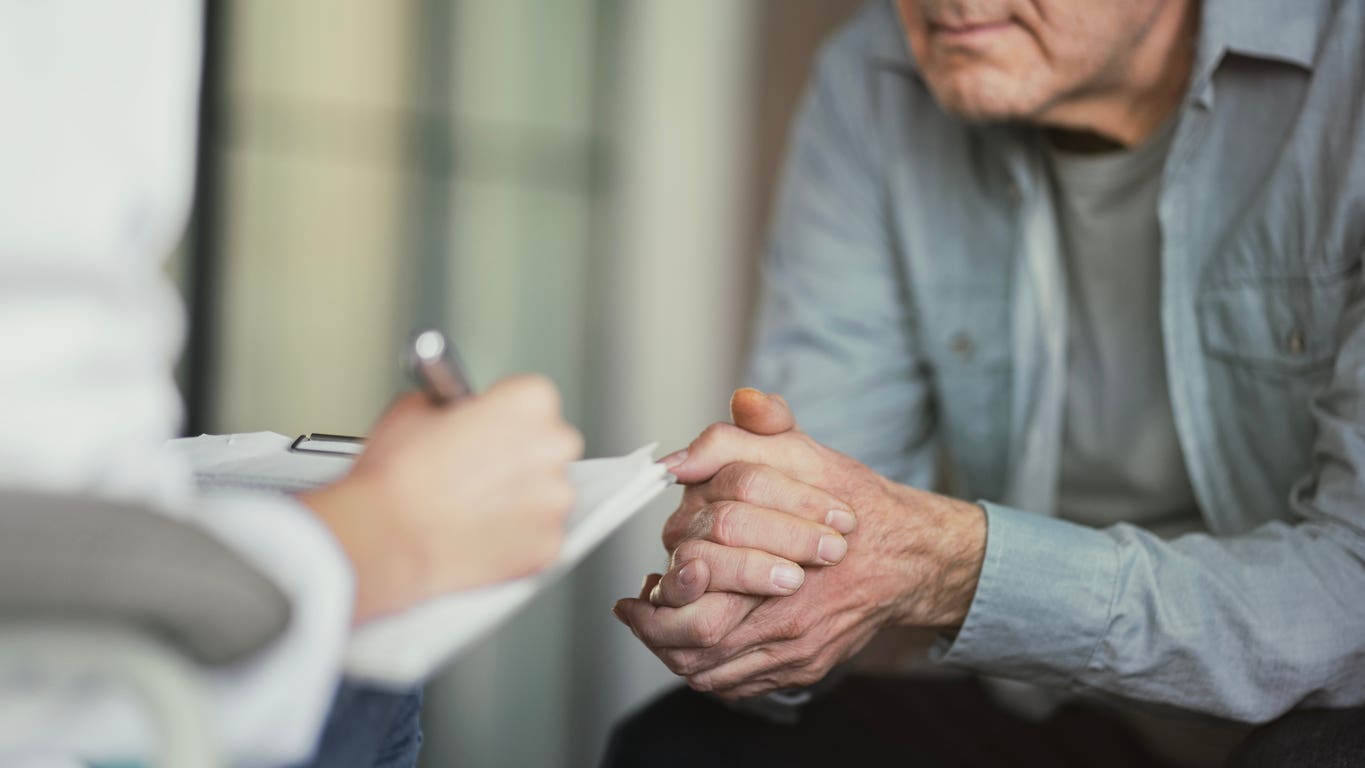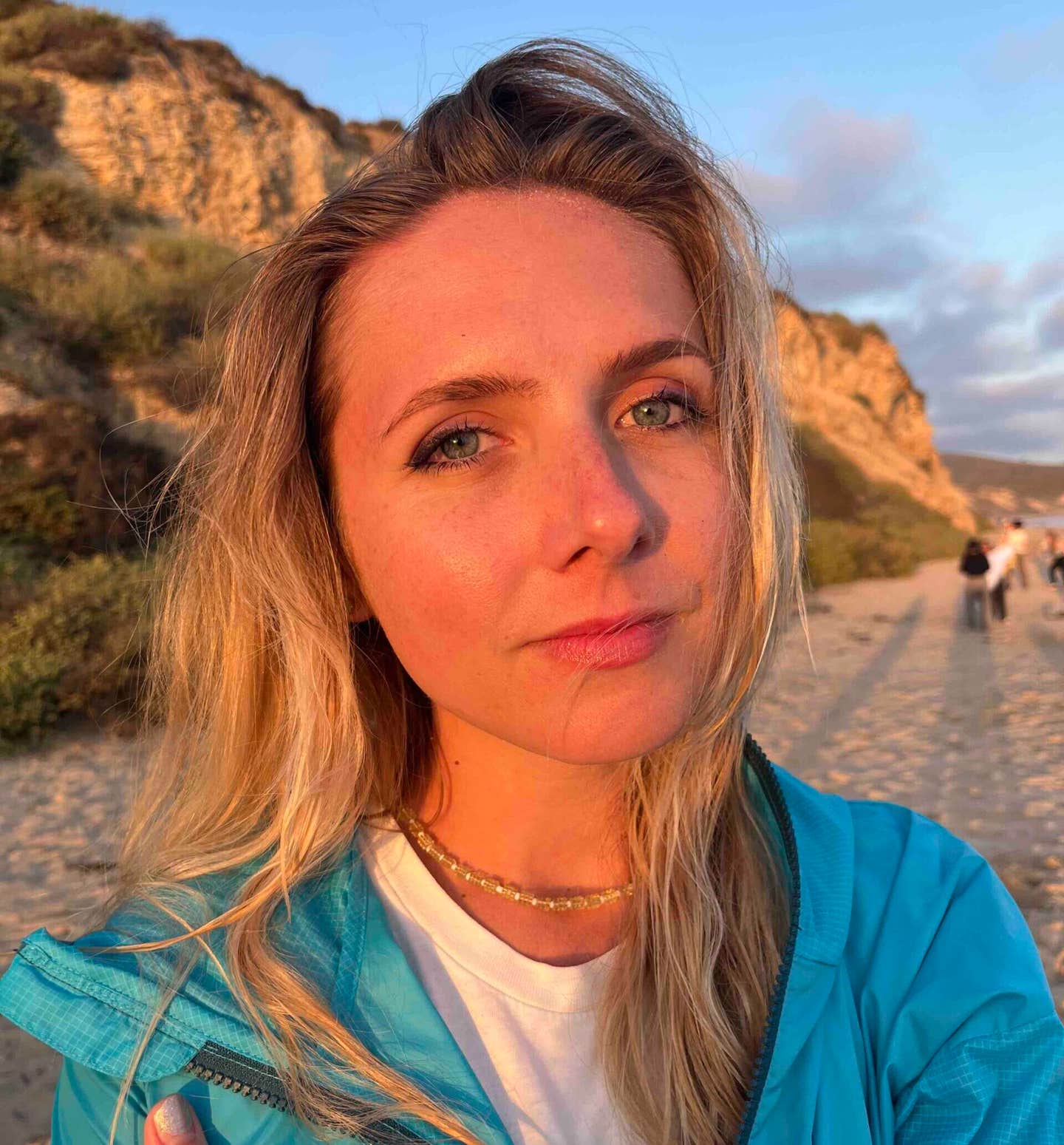
‘Korean Vegan’ Joanne Lee Molinaro Dishes on Her New Book, Vegan K-Beauty Line
Change has always been central to Joanne Lee Molinaro’s journey. A former trial lawyer and onetime Paleo devotee, she went vegan in 2016 and built a global following as The Korean Vegan, blending storytelling and plant-based cooking in ways that resonated deeply with her audience.
Since then, she’s expanded her creative reach, launching the vegan skincare brand Korean Vegan Beauty and, most recently, publishing her second cookbook, The Korean Vegan Homemade: Recipes and Stories From My Kitchen. The new book reflects a looser, more exploratory side of Molinaro, filled with Korean-inflected takes on global comfort foods. “The first book was more traditional Korean cuisine—things that any Korean American or Korean person would think, ‘Oh, yeah, this belongs in a book about Korean food,’” Molinaro says. “In the second book, you’re going to see much more of the Korean twists—Koreanized versions of American foods, Italian foods, Mexican food, which is more in line with the way I usually eat.”
We caught up with Molinaro during a break in her recent book tour to talk about the new book, how her cooking philosophy continues to evolve, and why The Great British Bake Off remains one of her biggest inspirations. Watch our full conversation or read on for the highlights, below.
How's the book tour going?
Molinaro: It's been amazing. I'll be candid with you: My new book did not make The New York Times Bestseller list, and that was hard for me to grapple with, after the first book was so successful. But the book tour has a balm to that, seeing so many people come out and support me. We've been selling out the events. It's really buoyed me and made me realize that my work is still valuable.
You went vegan for ethical reasons. Did you notice any side benefits to your health?
Molinaro: My cholesterol went down a lot. I think at some point it had been around 200 total, and it’s never gotten anywhere close to that since going vegan. I think that my overall inflammation went down, too. I used to have a scar on my body from a surgery, and it was always irritated, itchy, and bumpy, like a rash. I had it for three years, and I figured, “I guess I’m just gonna have this forever.” But all of a sudden, after I went vegan, it just went away, and I haven't had it since.
Could you talk about The Korean Vegan Homemade cover recipe?
Molinaro: It’s Budae Jjigae, or army stew. There’s so much that one could say about that stew. It's one of my favorite ways to eat—putting a lot of my favorite flavors into a pan or a pot and just letting it simmer. The great thing about budae jjigae is that it's just got so many hallmark ingredients of Korean food. It's got kimchi, it's got gochujang, it's got sesame oil, it's got silken tofu, rice cakes. But the dish also has so much history behind it: It’s your quintessential “fusion” dish, in that it was what Korean people cobbled together during the era right after the war, when they were so hungry, they were starving to death, and so they took whatever leftovers the American GIs were not eating, and mashed that together with their own foods, like kimchi, and came up with this dish, which is aptly named army stew. … This is what you eat late at night, when you want something that's very comforting, but spicy and delicious, and really hits that spot. It's also one of my father's favorite dishes.
The Korean Vegan Homemade isn’t an oil-free cookbook. Can oil-free readers adapt the recipes?
Molinaro: I've been thinking a lot about this over the past year. When I was writing this cookbook, I was not as focused on oil-free as I am right now, so you won't see as much of that in this book. I had a little bonus chapter that I wrote for people who pre-ordered, and by that time I was very conscientious of oil-free recipes, and so you'll see very clearly, “Oh wow, Joanne now has very explicit recommendations on how to make substitutions to make this oil-free.” Unfortunately, I was not already thinking that way when I developed the recipes for the book.
But I would focus on the soups and stews. I almost always start them with a little bit of sesame oil and a little bit of extra virgin olive oil to roast the gochugaru or roast the veggies, but you can simply replace it with water or broth, which is a tried and tested way of doing soups and stews when you're whole-foods, plant-based. Maybe throw in a tablespoon of toasted sesame seeds at the very end, so that you're not losing out on that rich sesame aroma and the health benefits that are associated with sesame seeds. I'm a big fan of Dr. [Michael] Greger—I've read his books many, many times—and I love the way that he incorporates sesame seeds in his soups and stews.
Some of my recipes call for grated vegan parmesan; you can just leave that out, or throw in some [nutritional yeast] instead. The whole-foods, plant-based community is pretty savvy, and they're really good at making these types of substitutions.
Was there anything that you learned since the first cookbook that you wanted to do differently this go-around?
Molinaro: There were a couple of things. Number one, we wanted to rigorously third-party test all the recipes. When the book was first published, I had this moment of total fear—like, “Oh, my god, people who don't know anything about Korean food are gonna be making these recipes, and nobody but me and my mom and my cousins and my aunts have made them.” So this time we had it rigorously third-party tested, and that gave me peace of mind.
The other thing was, we heard very often that some people had trouble sourcing the ingredients [from the first cookbook]. I wanted people to not take the easy way out, and to understand the importance of these ingredients to the storytelling and my family’s history and the history of the food. So I’d basically offered no substitution recommendations—like, “Sorry, if you can't use this, then you can't make the dish.”
This time, I provided substitution recommendations, recognizing that if you're in England, or India, or Germany, some part of the world where gochugaru is just not easily accessible, I don't want you to feel like you can't make these dishes. So that’s one big difference between books one and two.
You draw inspiration not just from your own family, but your husband's family. Could you talk about the influence of your late father-in-law, Robert?
Molinaro: I don't know that I would have gotten into baking if it hadn't been for him. He was such a big baker. I'll never forget coming home from a race, and seeing this tray of huge muffins [he’d made]. That in itself has influenced the way I bake muffins now. I will never not use those jumbo muffin trays. And I thought, “Wow, you can have fresh baked muffins at home—how charming!” That began my passion for baking. I love it so much; I literally was watching an episode of The Great British Bake Off just before this. Robert really inspired that in me. He wasn't an obsessive baker. He had his tried and true recipes, knew what his wife liked, and he made those and was so good at it. For me, I always want to try new things, and [Robert] really set me off on this interesting exploration. Baking is a whole different ball of wax when you cut out eggs, butter, and dairy.
Would you ever do a baking cookbook?
Molinaro: I love baking so much, but I think it's really hard to write an entire book that's just on baking. … I just saw this beautiful cookbook, which isn’t vegan, called The Art of Gluten-Free Bread. That person is like a freaking Ph.D. in gluten-free bread, you know what I mean? They’ve devoted so much of their study to this craft. For me, baking is much more recreational. I'm not joking when I say that most of the [baking] recipes in my new book came from me seeing something on The Great British Bake Off and wanting to make it.
You think The Great British Bake Off can offer inspiration for vegan bakers?
Molinaro: First of all, there's at least one season where they had a vegan contestant. She veganized all of the recipes. She did not compromise. She made it really far, and the judges were always like, “Good lord, how did you do that?” I loved seeing that. I actually follow her on Instagram, because I was so proud of her, and how far she went, and how she consistently impressed these judges.
But for me, the whole show is an education. I'm not a studied baker. I never went to baking school; I don't know anything about pastry making. So, even just learning the [terminology], and wondering, What is that, and how can I veganize it? … I think it’s fantastic. I know so many vegan bakers who watch this show, probably for the same reason that I do.
What inspired you to launch the Korean Vegan Beauty line?
Molinaro: In 2018, I went with my mother to the Korean shopping center where we get our beauty products. I was about to get married, and I wanted to make sure that my skin was looking perfect. But when I went into the shop, I realized, “Oh, right, I’m vegan now.” I asked the clerk if the products were vegan, and she had no idea. That’s when I knew that we needed to come up with an explicitly vegan, cruelty-free K-beauty brand. At the time, I was still a partner at a law firm and buried with the first Korean Vegan cookbook and all of that, so it wasn't at the forefront. But three years ago, a company that was already in K-beauty reached out to me. They wanted to make a vegan K-beauty brand, because they just felt that plant-based ingredients would make for a better product. So we partnered together.
Trial lawyer, James Beard Award–winning cookbook author, skincare entrepreneur—what's next?
Molinaro: We're hopefully going to be launching another product or two in KV Beauty, which I'm really excited about. The one that we're testing right now is an exfoliator, and it is freaking amazing. And one day I would like to come out with a book that serves the whole-foods, plant-based community. Even if it’s not a totally oil-free cookbook, I’d like every single recipe to have an oil-free option. That’s the next challenge for the Korean Vegan. The health and the science is there. It's indisputable. [A WFPB diet] can change people's lives, and there is a community that needs to be served in that way. I would love to do a cookbook with WFPB recipes that a Korean person would eat and think, “Yep, that’s Korean.” That's something that I hope to do in the future. Right now, I need to take a break from cookbook writing for a bit.

About the Author

About the Author
Courtney Davison
Join our mailing list
Get free recipes and the latest info on living a happy, healthy plant-based lifestyle.
By providing your email address, you consent to receive newsletter emails from Forks Over Knives. We value your privacy and will keep your email address safe. You may unsubscribe from our emails at any time.